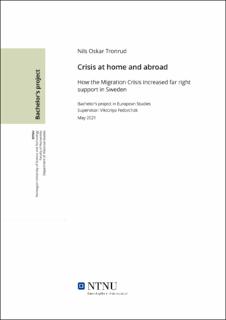Crisis at home and abroad
Bachelor thesis
Permanent lenke
https://hdl.handle.net/11250/2775730Utgivelsesdato
2021Metadata
Vis full innførselSamlinger
Sammendrag
I denne oppgaven undersøker jeg hvordan flyktningkrisa fra 2015 økte oppslutningen til Sverigedemokratene (SD) og hvorfor responsen til de etablerte partiene slo feil. Dette er gjort gjennom å fokusere på konseptene tilbud og etterspørsel. Jeg anvender dokumentanalyse for å undersøke og avdekke hvorfor strategiene, dvs. Tilbudet, til Sosialdemokratene og Moderatene slo feil. For å vise en økende etterspørsel for en restriktiv innvandringspolitikk anvender jeg statistisk analyse. Den økte etterspørselen gjenspeiles i økt skepsis til innvanding og økende fremmedfientlige holdinger. Holdningsendringene er reflektert i statistikk, en diskursanalyse utført av Yantseva, samt de skiftende holdningene til partiet Moderatene. I den politiske kampen om velgere endret Moderatene holding fra en liberal innvandringspolitikk til å ta til orde for å begrense innvandring kraftig. Sosialdemokratene beskyttet prinsippene bak en liberal innvandringspolitikk mens de implementete lovendringer som begrenset innvandring. Strategiene falt derimot i SD sitt favør gjennom å øke prevalansen av innvandringsdebatten og styrke troverdigheten til SD sitt innvandringskritiske sysnpunkt. Jeg konkluderer med at flyktningkrisa fra 2015 er et godt eksempel på hvordan en hendelse kan påvirke den politiske status quo, og at politiske aktører spiller an avgjørende rolle i denne prosessen. This thesis examines how the Migration Crisis of 2015 furthered the Sweden Democrats’ (SD) electoral success and why the strategies of the mainstream parties failed. This is done through a demand-side and supply-side approach, using statistical analysis to explain the growing demand for a party opposing immigration and document analysis to examine how the supply of the Social Democrats and the Moderates failed. The thesis finds that opposition to immigration and nativist attitudes increased among Swedish constituents following the Crisis, increasing the demand for restricting immigration for which SD was the established proponent. The changes in attitudes were reflected in statistical evidence, a discourse analysis and in the changing attitudes of the Moderates. Additionally, I found the approach of the mainstream to benefit SD through increasing issue saliency and boosting the credibility of their critical views on immigration. I conclude that the Migration Crisis is a great example of how events may alter the political status quo in liberal democracies through altering demand and supply, and that political actors play a crucial role in this process.
